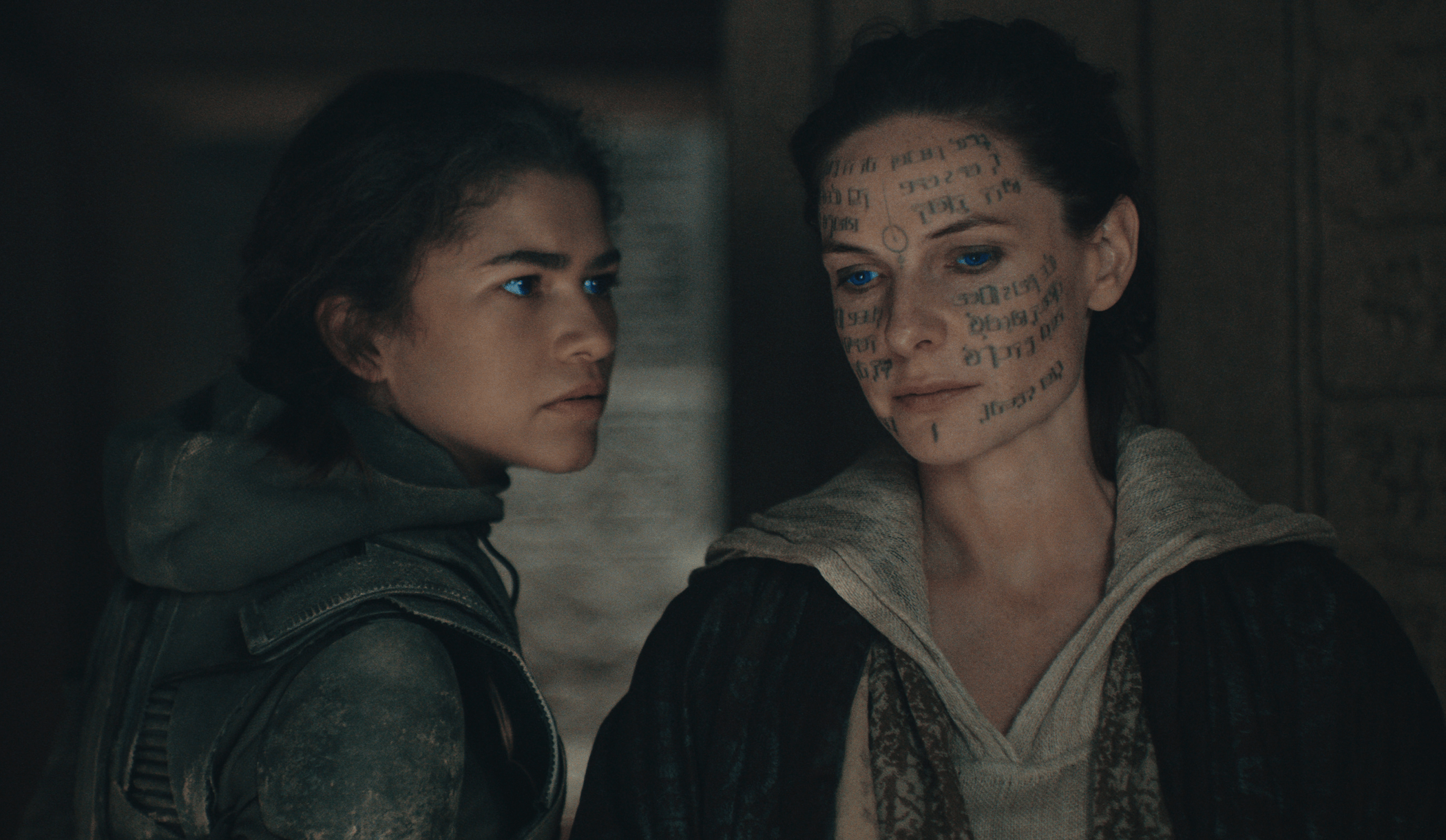Spoiler Alert
Dune: Part Two is the highly anticipated sequel to the phenomenal 2021 film, Dune: Part One, that garnered great critical acclaim and numerous accolades with its release. These films are director Denis Villeneuve’s cinematic take on Frank Herbert’s famous 1965 sci-fi novel of the same name. Adaptations of fantasy novels as detailed as Herbert’s Dune for the big screen have always been quite a difficult and tricky undertaking. Previously directors like David Lynch had tried their hand at bringing this best-selling sci-fi novel in history to screen.
Adaptations of fantasy novels as detailed as Herbert’s Dune for the big screen have always been quite a difficult and tricky undertaking.
Where Villeneuve particularly succeeds is that his interpretation looks like it was solely made for the large screen experience. Dune: Part Two is a visual masterpiece which while remaining faithful to the true essence of Herbert’s narrative cleverly arranges its landscape for the jump from the literary to the cinematic medium. The film also is poised to attract a substantial audience, boasting a star-studded ensemble including Zendaya, Timothee Chalamet, Florence Pugh, Austin Butler, and other notable names like Lea Seydoux.
Dune: Part Two starts off exactly where the first film had ended. It is evidently a continuation of the events of the first film. We find Paul Atreides and his mother Lady Jessica trying to become a part of the Fremen, the indigenous people of the land of Arrakis, to survive after the fall of their House of Atreides at the hands of the House of Harkonnen. Dune: Part Two expands upon the themes introduced in the first installment, delving deeper into the socio-political and ecological intricacies of Arrakis. The screenplay, penned by Villeneuve and Jon Spaihts, successfully balances exposition with action to maintain a sense of urgency and engagement in the film.
The director’s commitment to expansive world-building is evident in this film as from the very opening shot the audience is immediately plunged back into the immersive and mystic world of Dune. The entire Dune franchise is a testament to the enduring relevance of a sci-fi narrative that had been crafted in the 1960s. In the current landscape, its themes resonate strongly, especially amidst contemporary challenges such as the ongoing Palestinian genocide and other escalating perilous events across the world.
Imperialism and colonial settlements
The central conflict in the narrative lies over the control of spice found in the almost uninhabitable desert land of Arrakis. The spice melange is important in increasing life expectancy and also helps propound intergalactic travel. So control over spice means control over everything. Dune, as we get to know, is the ancient name of Arrakis as given by the natives. Through the perceptions of the character named Chani and her similar-minded comrades it becomes clear that while the great Houses fight over the control of Arrakis under the dubious commands of the Great Emperor, the land should and does belong to the Fremen, the indigenous people.
Dune, as we get to know, is the ancient name of Arrakis as given by the natives.
These people are one with the sand and continue to fight against the control of the imperial power of the Great Houses. Many times throughout the film the House of Harkonnen claims the Fremen to be rats because they survive in inhuman conditions and know the desert far far better than the Great Houses of other planets. To them the Fremen cannot be human and need only to be eradicated for spice control.
The South of Arrakis, which is supposed to be completely hostile to human life, is land yet untouched by the Houses who fear to venture that far, but the Fremen have and continue to have settlements there. So the larger context of the fight is between the indigenous people and the colonial settlers whose exploitation of Arrakis has left the land in desert ruins. Chani, in many of her speeches, is adamant that her people should rule.
Paul Atreides and the created Messiah
In one of his interviews, Denis Villeneuve talks about how Frank Herbert, after a mis reception of his first novel with Paul Atreides as a hero figure, wrote the second installment in the series as a way to correct that perception. Paul Atreides, from the very beginning is meant to be an anti-hero figure drawn into the allure of power. The exploration of religious fanaticism and its repercussions, one of the major themes of Dune, is most evident in this film further colouring our idea of Paul Atreides.
The film, with immense clarity, showcases how the very idea of a Messianic figure can be constructed by those in power to manipulate the masses. Faith for the Fremen is a strong thing, making survival possible even in the harshest of conditions, which is why when Paul arrives fulfilling prophecies so cleverly laid out by the Bene Gesserit, a powerful clan of which his mother is a part, the Fremen are all too ready to believe him as their Messiah.
Paul, from the very first film has been seen being groomed for power.
Paul, from the very first film has been seen being groomed for power. Both he and his mother, as foreigners among the Fremen, are aware from the very outset that the only way they can strike back against the Emperor and the House of Harkonnen, is if they garner the power of the liberation fighters amongst the Fremen. Paul tries to win over the Fremen and his is a journey of rise to power, getting more powerful with each passing day. Only Chani’s perception, as intended by Villeneuve, cuts through the idea of Paul as saviour because notwithstanding what he says, he is essentially using the myth surrounding him to gain more political power. He is, after all, not of Arrakis and not one of the Fremen.
Dune: Part Two with great shots of Paul controlling the sand worms to gain the respect of the Fremen and walking through huge masses as they divide and create a path for him in awe and fear, is effective in telling the story of how the trope of the white messiah functions. The desert planet of Arrakis remains a central character in its own right, and it is this cinematography, led by the talented Greig Fraser, that captures Dune’s harsh beauty with a combination of sweeping vistas and intimate close-ups. Utilisation of fear is an incumbent part of how religious fundamentalism and God worship of a mortal man works.
The women of Dune
The Bene Gesserit are a powerful clan of women seers and prophetesses and it is this group that essentially controls power in the world of Dune. The sisterhood embodies a nuanced exploration of true power and the role of women within the intricate fabric of the narrative. Renowned for their political acumen and mastery of mental and physical disciplines, the Bene Gesserit manipulate bloodlines and navigate the power structures of the universe with a long-term vision.
The women characters in Dune, notably the Bene Gesserit members like Lady Jessica, showcase a complexity that goes beyond traditional gender roles. They wield influence through intelligence, strategic alliances, and the mysterious powers bestowed upon them. They are integral architects of power dynamics, and have immense capacity to shape destinies and navigate the complexities of the universe.
The women characters in Dune, notably the Bene Gesserit members like Lady Jessica, showcase a complexity that goes beyond traditional gender roles.
As Levi Strauss famously says in the film Oppenheimer, ‘Power stays in the shadows’. The Bene Gesserit operate from the shadows. Their power is also a reflection of how women’s power works structurally different to that of men. How often do we find narratives where women characters are groomed to power like Paul Atreides is in the film? Women’s powers are essentially always subversive because the norm is that of men in power.
There are always conditions and moral implications attached to a woman’s rise to power, as we see in the growth of characters like Daenerys Targaryen in Game of Thrones. Chani and Princess Irulan, despite having a clear vision of how power is being manipulated know that their voice will fall to deaf ears and make different choices for survival. Irulan makes a political decision while Chani makes a personal one.
The ensemble cast, led by the brilliant Timothée Chalamet as Paul Atreides, delivers stellar performances once again. Chalamet’s portrayal of the reluctant hero navigating the complex political and mystical landscapes of Arrakis is both nuanced and powerful. The remaining cast, including Zendaya, Oscar Isaac, Rebecca Ferguson, and Javier Bardem, all contribute to the film’s rich character tapestry, each actor bringing depth and authenticity to their roles. The narrative unfolds with a gripping pace, seamlessly blending political intrigue, familial drama, and the mysticism inherent in the world of Dune.
As Paul Atreides embraces his destiny and grapples with newfound powers, the tension escalates, keeping the audience on the edge of their seats. Hans Zimmer’s score, a vital component of the first film’s success, once again plays a pivotal role in enhancing the emotional resonance of the story. The haunting melodies and rhythmic beats underscore key moments, elevating the overall viewing experience.
Villeneuve’s Dune: Part Two is a striking look at the manipulative power of religion, and despite a familiar setting of a fantasy narrative, the audience is engagingly sucked into how power is ambiguously created through myths leading blind faith to be invested in for control over the masses. One if left with the question, how are we to look at the character of Paul then? Now that he has finally made the decision to give into the thirst of power? And what comes next? Everyone will be eagerly anticipating the next installment in this rich, sprawling saga.
About the author(s)
Sayeri Biswas recently graduated with a bachelor’s degree in English from St. Xavier’s College, Kolkata. Whether it’s philosophically
contemplating life or gushing about the most recent book/series she has indulged in, she is always up for a deep conversation. Literature is the great love of her life, and in the future, she hopes to continue talking about all art forms as passionately as she thinks
about them.









